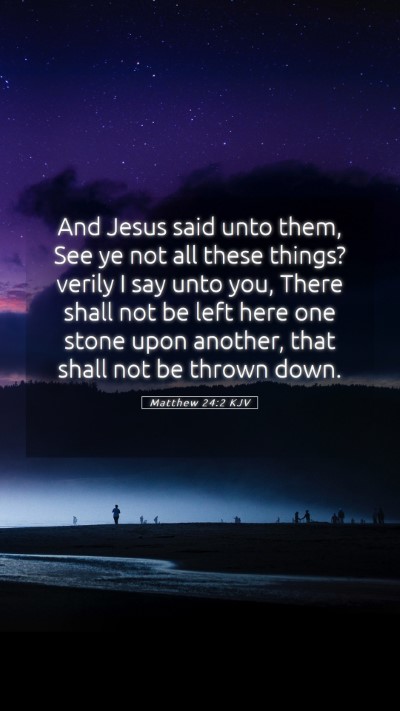Understanding Matthew 24:2
Matthew 24:2 states, "And Jesus said unto them, See ye not all these things? verily I say unto you, There shall not be left here one stone upon another, that shall not be thrown down." This verse is significant as it speaks to the prophecy of the destruction of the Temple in Jerusalem and offers deep insights when analyzed through various Biblical commentaries.
Contextual Background
To fully grasp the meaning of this Bible verse, it's important to consider its context. Matthew 24 is often referred to as the Olivet Discourse, where Jesus discusses the end times and the signs preceding His second coming. This chapter reveals a mix of immediate prophecy regarding the Temple's destruction and future events related to Christ's return.
Commentary Insights
Matthew Henry's Commentary
Matthew Henry focuses on the gravity of Jesus' pronouncement regarding the Temple's future. He emphasizes the glory of the Temple and warns that despite its beauty, God has the sovereignty to bring down what man perceives as secure. Henry reminds believers of the temporary nature of earthly structures and the importance of focusing on spiritual rather than material wealth.
Albert Barnes' Notes
Barnes highlights the historical significance of the destruction of the Temple, noting that it symbolized a turning point in God's covenant with His people. He explains that Jesus' foretelling serves as a reminder of the judgment to come and the necessity of being vigilant. Barnes stresses the importance of this warning for both first-century Jews and contemporary readers regarding the finality of God's decrees.
Adam Clarke's Commentary
Clarke elaborates on the literal fulfillment of Jesus’ prophecy in 70 A.D., when Jerusalem was besieged and the Temple destroyed. He remarks on the spiritual implications of this destruction, drawing parallels between the physical and spiritual sanctuaries. Clarke emphasizes that the focus should not be on the bricks and mortar of the Temple but rather on the presence of God among His people, which transcends physical structures.
Theological Themes
- Judgment and Accountability: This verse highlights the concept that God's judgment can be swift and thorough. It calls for self-reflection on how one lives in accordance with God's will.
- Temporality of Earthly Possessions: Jesus prompts believers to consider the fleeting nature of their material surroundings and the importance of investing in eternal things.
- Prophetic Fulfillment: This verse serves as a significant prophetic message, foreshadowing events that would come to pass, further establishing the authority of Christ's words.
Application for Believers
In applying this verse to daily life, it serves as a call to prioritize spiritual health and inner faith over earthly attachments. Believers are reminded that despite the trials faced, focusing on Christ as the true cornerstone provides hope and stability in a chaotic world.
Cross References
- Luke 21:6 - Reflects on the destruction of the Temple as well.
- Mark 13:2 - Offers parallel teachings regarding the Temple's fate.
- Jeremiah 7:14 - Discusses God’s judgment on the Temple due to the people's disobedience.
- Hebrews 9:24 - Contrasts earthly temples with the heavenly reality.
Conclusion
Matthew 24:2 serves as an important passage within the Gospels that encapsulates Jesus' prophetic authority and the stark reality of judgment. Through careful analysis and reflection using various public domain commentaries, one can gain deeper insights and understanding that enriches both personal Bible study and group discussions. These insights are essential for anyone seeking to deepen their knowledge of Scripture and its applications in life.
For those engaging in Bible study groups or seeking online Bible study resources, these interpretations and applications provide a foundation for understanding not just this verse, but the broader themes within Scripture.


